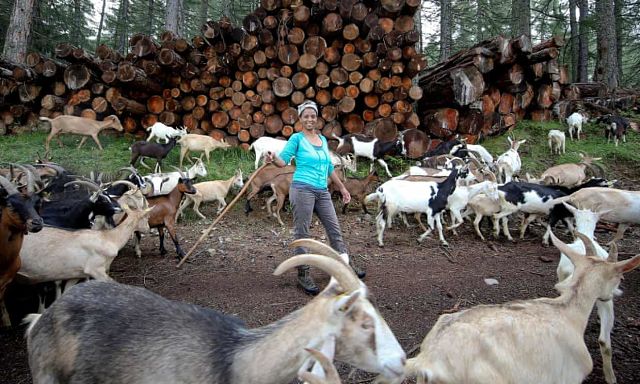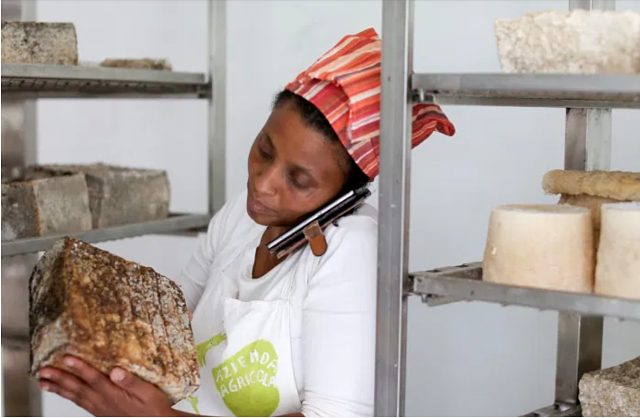The Economist
In all the world there was nothing as beautiful as a goat. As she sat among them on the steep wooded slopes of the Valle di Felice, watching them tussle and shimmy in the tall weeds, Agitu Gudeta rejoiced in their long shoulders and strong legs, their compactness and the grace of their horns, curving back like swords. When they came close, for they loved crowding round, she fondled their ears and kissed their noses, stroked their fine hair and basked in the sight of their faces gazing down on her against the clear Italian sky.
These were not just any goats, but Pezzata Mochena, the ancient piebald race of the high Alpine region near the Austrian border. They came in all goat-colours, but mostly streaked and patched with black or warm red-brown. In 2010, when she bought 15, they were almost extinct; within a decade she had 180, and knew the names and characters of every one of them. So she would chide Cinnamon, as she gently cleaned her udder, for sitting in muck again, and rebuke Kay for trying to climb into her car, and as she led them all out to pasture she would shush them like a congregation of children, blithely twirling her stick in her slim black hands.
—
UPDATE: Tributes Paid to Agitu Gudeta: The Ethiopian Farm Owner Killed in Italy

Agitu Ideo Gudeta, who was killed on Wednesday, used abandoned land to start a goat farming project employing migrants and refugees in Italy. She started with just 15 goats, increasing the herd to 180 in just a few years. She produced organic milk and cheese using environmentally friendly methods. Agitu was attacked and killed, allegedly by a former employee, on her farm in Trentino. (Photo: Reuters)
Tributes paid to Ethiopian refugee farmer who championed integration in Italy
Tributes have been paid to a 42-year-old Ethiopian refugee and farmer who became a symbol of integration in Italy, her adopted home.
Agitu Ideo Gudeta was attacked and killed, allegedly by a former employee, on her farm in Trentino on Wednesday.
Gudeta had left Addis Ababa in 2010 after angering the authorities by taking part in protests against “land grabbing”. Once in Italy, she tenaciously followed and realised her ambition to move to the mountains and start her own farm. Taking advantage of permits that give farmers access to abandoned public land in depopulated areas, she reclaimed 11 hectares (27 acres) around an old barn in the Mòcheni valley, where she founded her La Capra Felice (The Happy Goat) enterprise.
Gudeta started with a herd of 15 goats, quickly rising to 180 in a few years, producing organic milk and cheese using environmentally friendly methods and hiring migrants and refugees.
“I created my space and made myself known, there was no resistance to me,” she told Reuters news agency that year.
“Agitu brought to Italy the dream she was unable to realise in Ethiopia, in part because of land grabbing,” Gabriella Ghermandi, singer, performer, novelist and friend of Gudeta, told the Guardian. “Her farm was successful because she applied what she had learned from her grandparents in the countryside.
“In Italy, many people have described her enterprise as a model of integration. But Agitu’s dream was to create an environmentally sustainable farm that was more than just a business; for her it also symbolised struggle against class divisions and the conviction that living in harmony with nature was possible. And above all she carried out her work with love. She had given a name to each one of her goats.”
In a climate where hostility toward migrants was increasing, led by far-right political leaders, her success story was reported by numerous media outlets as an example of how integration can benefit communities.
“The most rewarding satisfaction is when people tell me how much they love my cheeses because they’re good and taste different,” she said in an interview with Internazionale in 2017. “It compensates for all the hard work and the prejudices I’ve had to overcome as a woman and an immigrant.”
Two years ago she received death threats and was the target of racist attacks, which she reported to police, recounting them on her social media posts.
But police said a man who has confessed to the rape and murder of the farmer was an ex-employee who, they said, allegedly acted for “economic reasons”.
The UN refugee agency said it was “pained” by Gudeta’s death, and that her entrepreneurial spirit “demonstrated how refugees can contribute to the societies that host them”.
“Despite her tragic end, the UNHCR hopes that Agitu Ideo Gudeta will be remembered and celebrated as a model of success and integration and inspire refugees that struggle to rebuild their lives,” the agency said.
“We spoke on the phone last week’’, said Ghermandi. “We spent two hours speaking about Ethiopia. We had plans to get together in the spring. Agitu considered Italy her home. She used to say that she had suffered too much in Ethiopia. Now Agitu is gone, but her work mustn’t die. We will soon begin a fundraising campaign to follow her plan for expanding the business so that her dream will live on.”
Gudeta would have turned 43 on New Year’s Day.
—
The Tragedy of Agitu Gudeta: An Ethiopian Immigrant Killed on Her Farm in Italy

Agitu Ideo Gudeta, 42, an Ethiopian migrant who became a symbol of integration in Italy, her adopted home, has been killed on her farm where she raised goats for her cheese business, police said on Wednesday. Agitu had made her home in the mountains of Trentino’s Valle dei Mocheni, making goat’s cheese and beauty products in her farm (The Happy Goat), which was built on previously abandoned land. (Reuters)
Reuters
Ethiopian migrant who became symbol of integration in Italy killed on her goat farm
ROME (Reuters) – An Ethiopian migrant who became a symbol of integration in Italy, her adopted home, has been killed on her farm where she raised goats for her cheese business, police said on Wednesday.
A Ghanaian employee on her farm in the northern Italian region of Trentino has admitted to killing Agitu Ideo Gudeta, 42, with a hammer and raping her, Italian news agency Ansa reported. The report could not immediately be confirmed.
Gudeta had made her home in the mountains of Trentino’s Valle dei Mocheni, making goat’s cheese and beauty products in her farm La Capra Felice (The Happy Goat), which was built on previously abandoned land.
Her story was reported by numerous international media, including Reuters , as an example of a migrant success story in Italy at a time of rising hostility towards immigrants, fueled by the right-wing League party.
Gudeta escaped from Addis Ababa, the Ethiopian capital, in 2010 after her participation in protests against ‘land-grabbing’ angered local authorities. Activists accused the authorities of setting aside large swathes of farmland for foreign investors.
On reaching Italy she was able to use common land in the northern mountains to build her new enterprise, taking advantage of permits that give farmers access to public land to prevent local territory from being reclaimed by wild nature.
Starting off with 15 goats, she had 180 by 2018 when she became a well-known figure.
“I created my space and made myself known, there was no resistance to me,” she told Reuters in a story that year.
—